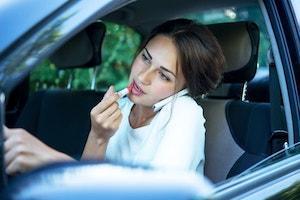Follow Us |Facebook
Call or Text for a Consultation
AAA Study: Hangover Effect of Distracted Driving
 The dangers of distracted driving have been well publicized. Laws have been enacted, as well as hundreds—if not thousands—of safety campaigns produced alerting drivers of just how deadly this driving behavior can be. Yet, despite all these warnings, people continue to die in fatal crashes caused by a driver who just did not listen.
The dangers of distracted driving have been well publicized. Laws have been enacted, as well as hundreds—if not thousands—of safety campaigns produced alerting drivers of just how deadly this driving behavior can be. Yet, despite all these warnings, people continue to die in fatal crashes caused by a driver who just did not listen.
According to data from the National Safety Council, almost half of all drivers admit to using their smartphones while driving, both manually or with a voice-activated feature. Smartphone manufacturers continue to develop new technology to improve these voice-activated features as a way to get drivers to stop manually using their phones, but a new study reveals that drivers who use the voice-activated features may be just as dangerous to everyone else on the road.
The study was conducted by the AAA Foundation for Traffic & Safety. The study team found that there is what they referred to as a “hangover effect” that happens whenever a driver focuses his or her attention away from their driving. In fact, that can last for up to almost half a minute before the driver sees what is in front of them again.
Researchers asked study participants to engage in some of the more common “distracted driving” behaviors while they were driving, including talking on the phone, setting GPS, and the using voice-activated option for text messaging, emailing, or listening to an audio book. The conclusion was that participants were extremely distracted from their driving by these activities compared to other activities, like listening to music, which researchers found only caused what they classified as a minimal distraction.
This effect even occurred when a driver engaged while parked or stopped at a traffic light. As the driver begins driving away, their brain is still focused on what they were just doing (i.e. reading or sending a text message) and not on the road. The brain does not “see” what is in front of them, such as other vehicles or pedestrians. It takes the brain an average of 27 seconds to catch up to the driving activity.
Some of the new technology being developed to combat the distracted driving crashes may actually make it worse. For example, one company has a product that transfers the information on a person’s phone to a small screen that sits in front of drivers, enabling them to read their messages as they drive. However, this too creates a dangerous situation because the driver is looking at the screen instead of the road.
If you have been injured by a driver who was engaging in an unsafe driving activity, contact a seasoned Orland Park personal injury attorney to discuss what legal options may be available to you for your pain and loss. Contact Issa Law, LLC at 708-966-2408 for a free consultation.
Sources:
http://www.nsc.org/Connect/NSCNewsReleases/Lists/Posts/Post.aspx?List=1f2e4535-5dc3-45d6-b190-9b49c7229931&ID=180&Web=36d1832e-7bc3-4029-98a1-317c5cd5c625
http://newsroom.aaa.com/2013/06/think-you-know-all-about-distracted-driving-think-again-says-aaa/




